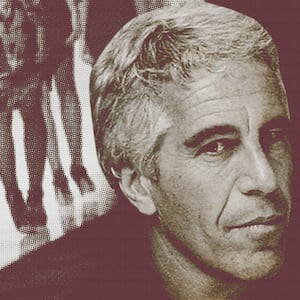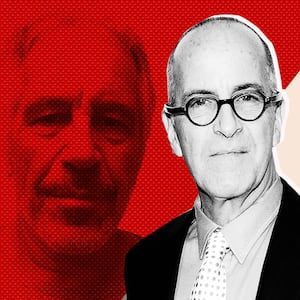Jeffrey Epstein signed his last will and testament just two days before he killed himself in his Manhattan jail cell—naming as his backup executor a former adviser to Bill Gates who doesn’t even want the job.
Epstein’s longtime lawyers, Darren K. Indyke and Richard D. Kahn, were named as primary executors of the estate and are slated to receive $250,000 of the $577 million fortune for their efforts.
But the document shows the disgraced money-manager also selected an alternate executor in the event that Indyke and Kahn can’t carry out their duties: Boris Nikolic, an immunologist and biotech entrepreneur.
ADVERTISEMENT
Nikolic was reportedly “shocked” to learn that he was listed in the will—which dictates that all of Epstein’s personal property should go to the trustees of a mysterious entity called The 1953 Trust.
“I was not consulted in these matters and I have no intent to fulfill these duties, whatsoever,” he said in a statement obtained by Bloomberg.
Nikolic, who studied and worked at Harvard, was the chief scientific adviser to Microsoft founder Gates and his foundation. He’s currently the managing partner of Biomatics Capital.
Nikolic’s spokeswoman told Bloomberg that Epstein was not an investor in any of his ventures, and the extent of their relationship was not completely clear. But Epstein cultivated ties with scientists, and CNBC reported last week that he met Gates at least once in 2013.
Epstein was indicted in July on federal sex trafficking charges and denied bail. He hanged himself at the Metropolitan Correctional Center on Aug. 10, just days after signing the will in lockup.
The document, which was first revealed by the New York Post, indicates he left behind an estate worth $577,672,654. It did not name the members of The 1953 Trust.
The will names Epstein’s brother, Mark Epstein, as his sole relative “who would be entitled to share the estate if he had left no will.”
According to the probate petition, Epstein had $56.5 million in cash; $14.3 million in fixed income investments; $112.6 million in equities; and $194.9 million in hedge funds and private equity investments.
The financier recorded $18.5 million in “Aviation Assets, Automobiles and Boats,” while stating that “Fine Arts, Antiques, Collectibles, Valuables & Other Personal Property” are “subject to appraisal/valuation.”
Bridget J. Crawford, a professor at the Elisabeth Haub School of Law at Pace University, said The 1953 Trust’s beneficiaries are unlikely to become part of the public record.
“He created some sort of trust very shortly before he died to receive all his property, and the reason people do that is to keep private from the public who is the beneficiary,” Crawford told The Daily Beast, adding, “The will is public, but the trust itself is not.”
While Epstein’s accusers and the government can file claims against the estate, the only person who can challenge the validity of the will is the financier’s only relation: Mark Epstein.
“Mark could come forward and say, ‘This is not a valid will, it was executed when he was not of right mind.’ There [could] be multiple possible grounds for doing so—fraud, undue influence, duress for example,” Crawford said.
“That would be a way Mark could overturn the will and take the entire estate.”
Crawford said Epstein’s final wishes will take several years to sort out. Creditors and tax collectors could come forward, seeking to secure assets from the trust. Parties in the trust could challenge it.
And the feds that were prosecuting Epstein could bring a legal action to freeze the estate, too. “That’s why the executors are not paying anybody any money anytime soon,” Crawford said.
Now that the will has been filed, creditors will get notice of probate, “and that will be anyone who is a known creditor of Mr. Epstein’s, including the U.S. government most likely,” Crawford added. “I expect the court to be inundated with claims against the estate. This thing’s going to go on for years.”
In the will, Epstein detailed the companies that hold the titles to his properties in New Mexico, the U.S. Virgin Islands, Florida and New York.
He listed 10,000 shares of Maple, Inc.—the Virgin Islands corporation that holds the title to his Manhattan townhouse—as worth $55.9 million.
Another 10,000 shares of Cypress, Inc., which owns his New Mexico ranch, are worth $17.2 million. His Palm Beach mansion, owned through 10,000 shares of Laurel Inc., is worth more than $12.3 million.
SCI JEP, a French company, holds the title to Epstein's seven units at the posh Paris building at 22 Avenue Foch. The document lists 999 shares worth $8.67 million.
Finally, the document details the companies that own his private islands.
The will includes 10,000 shares each of Poplar, Inc., which holds the title to Great St. James Island and is worth more than $22.49 million, and Nautilus, Inc., which owns the $63.87-million Little St. James Island.
The document directs lawyers Indyke and Kahn to get $250,000 upon the completion of probate. In Aug. 15 court filings, Indyke and Kahn accepted their appointments and enlisted Virgin Islands law firm Kellerhals Ferguson Kroblin PLLC as their attorneys.
Erika Kellerhals, another loyal Epstein lawyer who was named in tax documents for his charities, is a partner of the firm.








